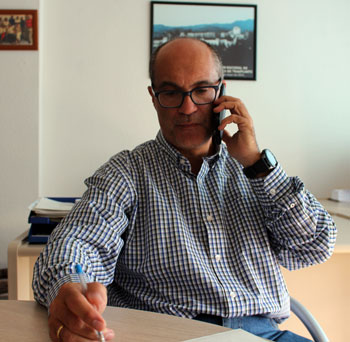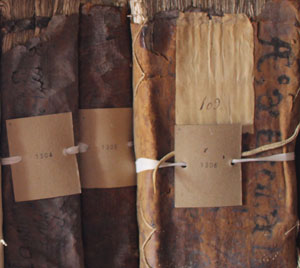Life in Spain is so much more fun when you know a little bit about how society works. But you can't just walk in everywhere and ask what people actually do there. That's why we do that for you. In this episode of Vida Española, we talked to Domingo Daga Ruiz, coordinator of the transplant team in the Málaga region.
Tekst & foto's: Maria Kupers
Published in ESpecial Life in 2019
You probably don't think about it every day, but there will come a time when you die. If this happens in a hospital, there is a good chance that your next of kin will be asked whether they grant permission for the transplantation of your organs and tissues. Spain has been number one for many years when it comes to the number of transplants performed per inhabitants. According to Domingo Daga Ruiz, this is not because by law everyone is a donor. “Spain passed a law in 1979 which states a number of things: firstly, that transplants are always performed in public hospitals and that the recipient of a donor organ does not have to pay any money for it. Anyone legally resident in Spain is entitled to a transplant. In the event of an emergency, non-residents can also receive a transplant. In addition, donating and receiving an organ is always anonymous. And the law assumes that everyone agrees to donation, in short, everyone is a donor according to the law. However, no doctor doing this job has ever followed that law,” Domingo said. I've never heard of a doctor who says they don't follow the law, this needs some explanation. “For us, the law is more of a statement of principles. The Spanish people declare that they want to be a donor. But as long as someone has not explicitly stated that he or she does not want to be a donor, it is the family that decides. We will never ignore the wishes of the next of kin under the guise of the law.”
 Spain leads the way
Spain leads the way
Spain was the first country in the world to introduce such a law and many countries have since followed suit. Everyone in the Netherlands is now also a donor unless otherwise registered. That has caused a lot of fuss there, Domingo Daga understands that to some extent. “People are very afraid of obligations in such matters, but you can also state in the Netherlands that you do not necessarily want to be a donor. Moreover, there as well as here the doctors will never adhere to the law at all costs. That is unthinkable in such emotional situations. In Spain, the next of kin are always asked what the deceased's wish would be and what the family itself wants. Unless it has been established in writing that someone does or does not want to be a donor. The only way to do that is through a medical will. If a clear choice has been made there, it is legally valid.
Smooth organization
The success of the Spanish model is not due to the law, but to the organization of the transplant team. That team consists of doctors and nurses who are active on the work floor every day. “In other countries, the coordinators often sit in an office waiting for a phone call and then get to work. In Spain, they are people who work in the First Aid Department or the Intensive Care Unit. In the smaller hospitals there is one coordinator, here at the Hospital Regional de Málaga (formerly Carlos Haya) there are six of us: three doctors and three nurses. As soon as someone has died, we start with all the necessary tests ourselves to see if someone is suitable to be a donor. In addition, someone sits down with the next of kin to guide them through the first stage of mourning and to discuss possible donorship. Although we take the time for this, we are of course faced with time pressure, the sooner organs can be placed in another body, the better.” As soon as all data is known, it will be sent to the Centro Nacional de Trasplantes in Madrid. They look at which patients match the donor's profile and based on urgency and then the geographical distance, the choice is made. Then a special team of transplant surgeons goes to the hospital where the deceased is located.
Domingo is coordinator of the Málaga sector, which includes not only the entire province but also Almeria, Ceuta and Melilla. In Málaga itself, organ transplants (kidneys, liver and pancreas) are only performed in the Hospital Regional, in the hospital Virgen de la Victoria they do the tissue transplants. Heart transplants are always performed in Córdoba or Seville and lung transplants are also performed in Córdoba. This division has been made in such a way that the doctors remain truly specialized in one particular type of transplant. The donors do not only come from the public hospitals in the Málaga sector. People who die in private hospitals and are eligible to be donors are also immediately reported by the doctors to the team in Málaga.
Fewer and fewer donors
The waiting list for a transplant is on average three to six months. Although in more than 90% of the cases the relatives give permission for a transplant, there is always a shortage of donors. “In the 1970s and 1980s we had a lot of road deaths, often young people. Today it is a lot safer on the road and we notice that in the statistics. Most donors are now between 65 and 75 years old, although it sometimes happens that someone aged 80 or 90 is among them. Most of them die from a brain haemorrhage. Until 2012, only people who had been declared brain dead could be used as donors in Spain. Since in other European countries people who died of cardiac arrest could also be donors, this is now also the case in Spain. What is striking is that older people are now much healthier than in the past, even organs that have served for years can continue to work for a long time in another body,” says Domingo.
Foreign donors
The Costa del Sol is home to tens of thousands of foreign residents. They can also be donors. “All hospitals have interpreters for different languages and we have a list of people here who can translate for us anyway. However, it is more common among foreigners that it is difficult for us to find the next of kin. We often contact the consulate or embassy for this, and they will start searching as well. Sometimes we go with the police to the home address of the deceased to see if we can find a clue there. Not only to be able to trace the next of kin, but also to find out a medical history. If we don't have this, despite all the tests we perform on site, we will never be able to prepare a complete file for the transplant. But usually we succeed, despite the short term. Families abroad do not have to jump on the plane, we have already sent the consent forms several times by e-mail and received them signed back. The entire procedure should not take more than 36 hours, after that the chance of a successful transplant is too small.”
Philosophy of life
After we've been talking for more than two hours about all kinds of situations and beliefs surrounding life and death, I'm curious what influence his work has on Domingo's philosophy of life. “It is very clear to me that life is finite. The greatest gift you can give to yourself and others is time. If you are a donor, you also give others time after your death. I try to spend my time on things that really matter to me, I enjoy the little things in life. I feel happy by making others happy.”



